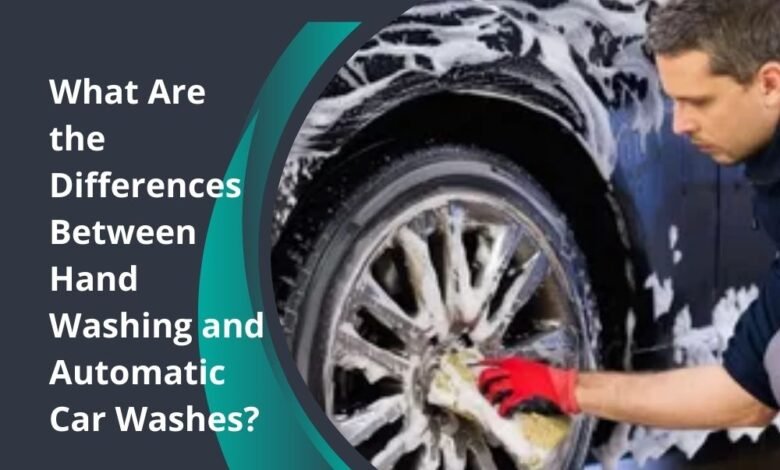
When it comes to taking care of your car, keeping it clean is one of the most important steps in maintaining its appearance and overall condition. Regular car washing helps protect the paint, remove dirt and grime, and prevent rust and other forms of damage. However, one of the most common decisions car owners face is whether to go for a hand wash or use an automatic car wash. Both methods have their benefits and drawbacks, and the choice often depends on personal preference, time, and budget.
In this blog, we will explore the key differences between hand washing and automatic car washes. We’ll break down how each method works, their pros and cons, and which one might be the best fit for your vehicle.
Understanding Hand Washing: A Personalized Approach
Hand washing a car is exactly what it sounds like—cleaning the car by hand, typically using a bucket of water, soap, a sponge, and a towel. This process is often done at home or by professional car detailers who specialize in giving cars a more thorough and detailed cleaning.
Note: Experience a professional car wash in Dubai Investment Park with Toretto Auto Services. Offering fast and thorough cleaning for all types of vehicles, they ensure that every corner of your car is spotless. Whether you need a quick wash or a full detailing service, their team is ready to serve you. Visit Toretto Auto Services and keep your car looking brand new.
How Hand Washing Works
Hand washing involves several steps to ensure that every part of the car is cleaned properly. Here’s a general overview of how it is done:
- Pre-Rinse: The car is rinsed off with water to remove loose dirt and debris.
- Soap Application: A car-specific soap is applied using a sponge or wash mitt, carefully scrubbing the car’s surface.
- Detail Cleaning: This includes cleaning areas like the wheels, tires, and undercarriage that may require extra attention.
- Final Rinse: After scrubbing, the car is rinsed again to remove the soap.
- Drying: A microfiber towel or chamois is used to dry the car and prevent water spots.
Pros of Hand Washing
- Thorough Cleaning: Hand washing allows for more attention to detail, ensuring that every corner of the car is cleaned properly.
- Gentler on the Car’s Paint: Since the person washing the car can control the pressure and use appropriate materials, it is less likely to damage the paint.
- Customization: If your car has specific areas that need extra care, such as intricate rims or a delicate paint job, hand washing can be tailored to address these needs.
Cons of Hand Washing
- Time-Consuming: Hand washing takes longer than an automatic wash. It requires patience and effort, especially if done properly.
- Skill Dependent: If the person washing the car is inexperienced or uses improper materials, it can still lead to scratches or damage.
- Water Use: Hand washing often requires more water, especially if done without water-saving measures.
Understanding Automatic Car Washes: Speed and Convenience
Automatic car washes offer a quicker and more convenient way to clean your car. These are usually found at gas stations or dedicated car wash facilities, where you drive your car through a machine that washes and dries it automatically.
How Automatic Car Washes Work
Here’s a basic overview of how an automatic car wash works:
- Initial Rinse: The machine sprays the car with water to loosen dirt.
- Soap Application: The car is sprayed with soap, which is then scrubbed off using rotating brushes or cloth strips.
- High-Pressure Rinse: The car is rinsed with water under high pressure to remove soap and dirt.
- Drying: The car goes through a drying stage, where powerful air dryers remove excess water.
Pros of Automatic Car Washes
- Fast and Convenient: An automatic car wash takes just a few minutes, making it ideal for people with busy schedules.
- Consistency: The machine washes the car the same way every time, providing a consistent level of cleaning.
- Water Efficiency: Many automatic car washes are designed to use less water than traditional hand washing, and some even recycle the water used.
Cons of Automatic Car Washes
- Risk of Scratches: The brushes and cloth strips used in some automatic washes can cause small scratches or swirls in the car’s paint.
- Less Attention to Detail: Since the machine is doing the work, areas like the wheels or undercarriage may not be as thoroughly cleaned.
- Limited Customization: Automatic washes follow a standard procedure and can’t address specific areas that may need extra care.
Comparing Hand Washing and Automatic Car Washes: Which Is Better?
Now that we’ve explored how both hand washing and automatic car washes work, let’s compare them in different categories to help you decide which method is best for your vehicle.
1. Time and Convenience
- Hand Washing: Requires more time and effort, making it less convenient for people with busy schedules.
- Automatic Car Washes: Offer a fast and easy way to clean your car, usually taking just a few minutes.
Winner: Automatic car washes are better if you’re short on time and want a quick solution.
2. Cleaning Thoroughness
- Hand Washing: Provides a more detailed and thorough clean, especially for hard-to-reach areas.
- Automatic Car Washes: While efficient, automatic washes may miss certain spots, like wheels or the undercarriage.
Winner: Hand washing is the better option if you want a more meticulous and thorough clean.
3. Risk of Damage
- Hand Washing: When done correctly, hand washing is gentler on your car’s paint and less likely to cause scratches.
- Automatic Car Washes: The brushes and materials used in some automatic washes can cause scratches or swirl marks on the paint.
Winner: Hand washing wins here, as it is less likely to damage your vehicle when done properly.
4. Water Usage
- Hand Washing: Typically uses more water, especially if done without water-saving methods.
- Automatic Car Washes: Many modern automatic washes are designed to use less water, with some even recycling water to reduce consumption.
Winner: Automatic car washes are more eco-friendly in terms of water usage.
5. Cost
- Hand Washing: Can be done at home, making it more affordable if you have the time and tools. However, professional hand washing services can be expensive.
- Automatic Car Washes: Generally affordable and offer various price levels depending on the type of wash you choose.
Winner: Automatic car washes tend to be more cost-effective, especially for regular use.
Which Method Should You Choose?
The choice between hand washing and automatic car washes ultimately depends on your needs, preferences, and priorities. Here are some scenarios that may help you decide:
Choose Hand Washing If:
- You want a detailed and thorough clean.
- You have a high-end car or a custom paint job that requires extra care.
- You enjoy taking the time to care for your vehicle yourself or want to ensure every part of your car is cleaned properly.
Choose Automatic Car Washes If:
- You’re short on time and need a quick, convenient solution.
- You’re looking for a more affordable, regular cleaning option.
- You’re not concerned with a deep clean and are okay with a general wash.
Conclusion: Finding the Right Balance
Both hand washing and automatic car washes have their advantages and disadvantages. Hand washing offers more control and a higher level of detail, while automatic car washes provide speed and convenience. The best approach may be to use both methods depending on the situation. For example, you might rely on an automatic car wash for routine cleaning but opt for a hand wash every few weeks to give your car a more thorough treatment.
In the end, the choice comes down to what matters most to you—time, convenience, cost, or care for your vehicle’s appearance. By understanding the differences between hand washing and automatic car washes, you can make an informed decision that keeps your car looking its best while fitting your lifestyle and budget.
For More Insightful Articles Related To This Topic, Feel Free To Visit: toastul.



